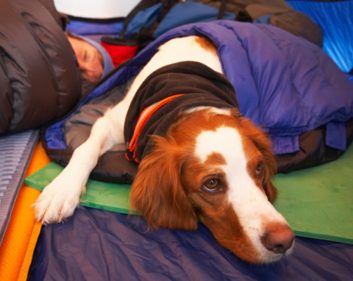What to know before you camp with your dog
Want to escape to the great outdoors with your dog? Here’s what you need to know before you camp with your canine

Source: Best Health magazine, Summer 2013; Image: Thinkstock
Know your dog
Before you book a campsite, evaluate your pet. Is he afraid of the woods? Does he bark excessively? Dr. Nicole Gallant, a veterinarian in Kensington, P.E.I., says the ideal camping dog ‘isn’t nervous, is well socialized and isn’t aggressive toward people or other dogs.’ If your pet passes the test, your next step is to check that dogs are welcome at your campsite and at beaches (or that there are designated pet beaches). Parks Canada campgrounds, for example, follow the National Parks of Canada Domestic Animals Regulations: Dogs are allowed, but certain stipulations must be obeyed, such as keeping dogs on a leash not longer than three metres. Check the park’s list of regulations before you go.
Visit your vet
According to Gallant, dogs with certain conditions such as heart problems, or breeds with breathing difficulties such as pugs and bulldogs, might struggle in the heat, so check with your vet. He or she will also review your dog’s vaccinations as well as flea, tick and heartworm medications; and let you know if your destination requires additional immunizations. Be sure to check all of this well in advance of your trip.
What to pack
If your dog is cleared for camping, plan to keep him cool and shaded. ‘Bring a fan if the campground has electricity, or put ice packs in your dog’s crate so he can lie on them and cool down,’ says Gallant. Your dog’s crate is also handy for naps, and to keep him safe from any roaming wildlife. Gallant recommends your dog wear a collar with his tags’licence, rabies and ID (including your cellphone number)’and that he be microchipped. Pack an extra collar and leash in case one breaks. Also pack collapsible, portable bowls; your dog’s regular food; and plenty of bottled water (drinking from streams, lakes or the ocean can spark diarrhea in your dog).
Medical necessities
Your first-aid kit can be used for your pet, too; Gallant suggests that you stock it with bandages (gauze and wrap), antibiotic cream, hydrogen peroxide (for cleaning wounds), Benadryl (for allergic reactions like hives), and any other medications that your dog takes on a regular basis.
Food safety
Wild animals such as bears and raccoons might be attracted to your pet’s food, so store it the same way as your own. If you’re roughing it outdoors, suspend all food from a tree limb, or keep it locked inside your vehicle. And beware of leaving bones and food scraps on the firepit, or turning your back on that nice tray of marinating steaks on your picnic table. Not only could you attract other animals’your pet might just eat your dinner raw. He’ll be really happy, but you won’t be.
This article was originally titled "Will your dog be a happy camper?" in the Summer 2013 issue of Best Health. Subscribe today to get the full Best Health experience’and never miss an issue!




